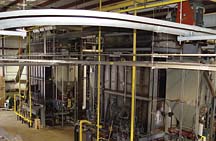
It was a unique business pro-position for a unique facility.
A few years ago, the PA DOC decided to close an older prison in Pittsburgh and build a new facility in Fayette County. But the building site that was chosen presented a real challenge.
The state decided to build the institution on top of a 400-foot precipice that borders the Monongahela River. The nearest town is on the other side of the river, and the nearest bridge is 9 miles away. There is, at the base of the precipice, a small ferry, one of the few remaining cable ferries in the country.
In order to somewhat protect the site from the weather and, most importantly, prevent it from becoming an eyesore for the area's residents, it was decided to dig out part of the top of the mountain to create a bowl-like shape. The civil work included cutting approximately 100 feet off the top of the mountain. Because of its location and budgetary constraints, the original design had called for three large, firetube oil-burning boilers.
Pennsylvania, like many other states, mandates that a new state facility must use indigenous fuel. Northwestern Pennsylvania has oil around Erie and Oil City. This indigenous oil source could have been used to justify the firetube oil-burning boilers. However, space constraints made installing the firetube boilers impractical.

Chicken Litter And Turkey Feathers?
Due to operational cost concerns and increasing oil prices, the use of oil was revisited and a closer look was taken at using coal or waste coal indigenous to the area. There are a lot of waste coal piles in the southern and southwestern parts of the state where the facility sits, which makes waste coal an economical long-term fuel to produce steam.Power Consultants Inc., a de-sign firm located in Carlisle, Pa., was called in to solve the problem.
"We specialize in building steam facilities using energy from waste fuels, coal being just one of these fuels," said David Goldsmith, Power Consultants' design engineer. "Others are chicken litter, tires, plastics, turkey feathers, wood waste, construction demolition waste, and many more. So, we designed and implemented a waste coal fuel system for the steam plant."
Because the state's budget for changes was limited, Power Consultants proposed that a private entity, Fayette Thermal, would build, own, operate, and service a free-standing boiler plant (not the central utility plant on the facility grounds) using bituminous coal tailings in high-efficiency fluidized bed boilers. The company would supply the facility's steam needs under a long-term contract.
The fluidized bed boiler plant is located 3,000 feet away from the facility, on its own property. It contains two fluidized bed boilers fired by the waste coal readily available in the area. Each provides 15,000 pounds per hour (500 hp) of steam. As for the central utility plant that was too small for firetube boilers, it had plenty of room for another part of the solution.

Instantaneous Backup
"When there is a problem with service from coal boilers because a mechanical system fails, an instantaneous back-up is paramount. Firetube boilers cannot respond like that," said Goldsmith.The high-efficiency, fluidized bed coal boilers are the heart of the facility's steam plant. Miura boilers were chosen to give a highly reliable instantaneous backup to the coal-fired system.
The boilers are located in the institution's central utility plant. Jacek Grob, Miura sales engineer, worked with Power Consultants and said, "Miuras were the only boilers capable of providing a backup in five minutes."
Goldsmith stated, "We've housed three, 300 hp EX gas-fired watertube Miura boilers in the central utility plant, which is on the facility grounds, but outside the secure facility walls. The accommodation is there for a fourth boiler to go in when and if they expand the facility to [house] a larger population. The fluidized-bed boilers, which are 3,000 feet away - three-quarters of a mile - from the facility on their own property, are connected by a steam line to the central utility plant."
Cannon Boiler Works of New Kensington, Pa., was hired to install the boilers. Fayette Thermal owns the three boilers inside the central utility plant. The boilers are in a lease-back agreement, so that eventually the state will own them. Fayette Thermal operates them all under a 20-year steam sales agreement.
"Maintaining the steam demand at the correctional facility is quite volatile, and that is another reason why we need the boiler's instant response," said Goldsmith. "For example, as you can well imagine, the inmates have to shower once a day. Just imagine 2,000 people showering in a three-hour period. If the two coal-fired boilers at the top of the hill are chugging along but can't respond fast enough to the steam requirements, then of course, one of these little Miuras kicks on and almost instantaneously supports the additional requirements."
By late October, the first inmates began arriving at the prison. Hundreds more are expected to take up occupancy in the next few months. Meanwhile, the boilers have been up and running since the spring of 2002. The unique business proposition has been a success.
Publication date: 11/10/2003

Report Abusive Comment